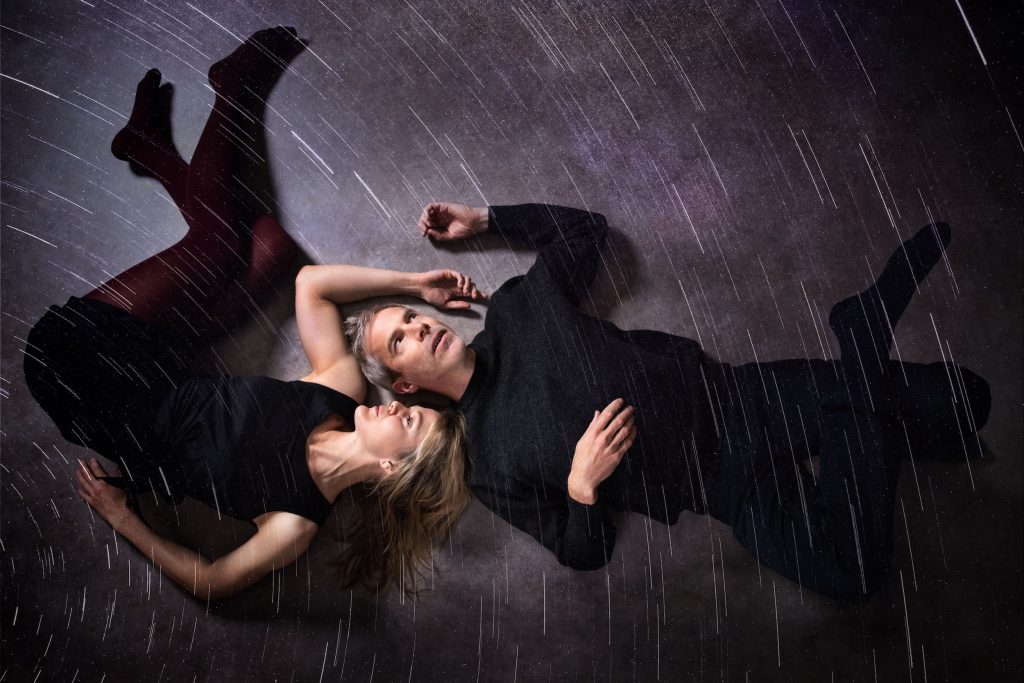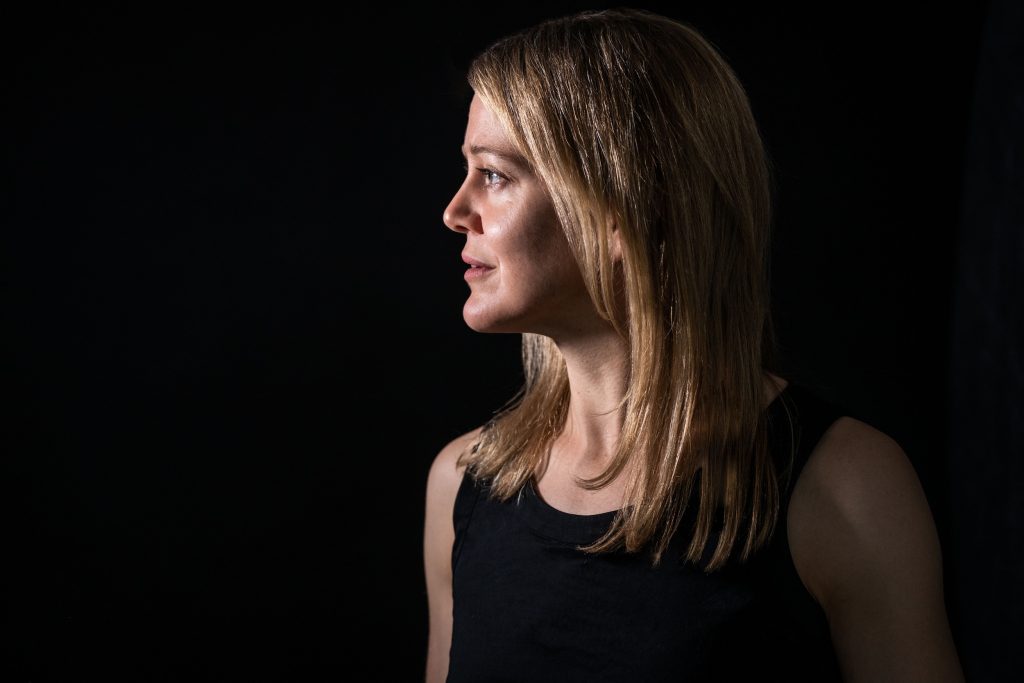
Credit: Dahlia Katz
At The Cultch until January 19, 2020
Tickets from $26 at 604-251-1363 or tickets.thecultch.com
Posted January 9, 2020
Obsession is a jealous mistress; she leaves little time for anything else. In Hannah Moscovitch’s play Infinity, Elliot, a brilliant PhD candidate in theoretical physics, is obsessed with time which, he says, is merely a human construct. How can it be otherwise when it’s already tomorrow in other parts of the world?
Elliot (Jonathon Young) seeks out Carmen (Amy Rutherford) at a party. He has already found out she is single and a violinist/composer who, he knows, must also be concerned with mathematics and time. He’s awkward, nerdy and endearing; she’s intrigued but says she can only offer him “fifteen to twenty minutes of sex, forty-five minutes of crying”. Two days ago her engagement to be married ended. She’s a mess of vulnerability.

Credit: Dahlia Katz
Time slips back and forth. At the top of the play (and even before we meet Elliot and Carmen) we meet Sarah-Jean (Emily Jane King), the daughter they will have. She’s a Harvard student working on her PhD in mathematics; she plays violin. A perfect blend of genetic material. She’s upset because her best friend at college, a “big, blond friend from Iowa”, has told her she’s “fucked up about love”. And she is. With parents like compulsive/obsessive Elliot and constantly angry Carmen – both of whom claim to love each other – what can Sarah-Jean possibly know about love?
Later in the play, we also see Sarah-Jean as a petulant, tantrum-throwing eight-year-old, obsessed with getting an alarm clock so she can practise her violin at 6AM – no earlier, warns her mother. Obsessed. All of them. Is there any room or time for love?
There’s a lot of talk about string theory, quantum mechanics and Elliot’s dream to integrate all the theories into a “theory of everything”. You don’t have to understand all the science to understand that Elliot, probably on the autism spectrum, is not a great husband or father. His mind is always elsewhere and he is completely self-absorbed. But Young imbues the character with such sweetness that we are inclined to forgive Elliot his idiosyncrasies. His ready smile, inept comments, awkward attempts at humour when giving a lecture – all make him falteringly, desperately human.
While our sympathies are likely with Carmen, who has given up her career in music to raise a difficult child more or less on her own, she is less engaging than Elliot because she is almost always angry. Amy Rutherford’s Carmen is tense, anxious, furious with only brief flickers of softness. Try as she might to leave Elliot, Carmen can never follow through.
And although Elliot comes, painfully, to understand that time might be real as well as a construct, it is the daughter Sarah-Jean who has, I believe, a meaningful breakthrough. And it’s a big, potentially life-saving epiphany: if time is both ‘made up’ and real, so might love be both ‘made up’ and real. Love can be supportive or destructive; love may be a choice we make. While Sarah-Jean’s angry outbursts and fragmented, broken style of speaking drive us crazy, young Emily Jane King’s portrayal is so authentic, so understandable, we cannot help but pity and hold out hope for Sarah-Jean. Indeed, the play, I believe, is really Sarah-Jean’s. Time for love has run out for Elliot and Carmen but Sarah-Jean has a lifetime ahead of her.

Credit: Dahlia Katz
Under the direction of Ross Manson, this Volcano Theatre (Toronto) production, originally co-produced by Tarragon Theatre, is beautifully staged on a minimalist setting backdropped by a white, semi-sheer wall on which appear lines like a musical score. A white table. A white chair.
Violinist Andréa Tyniec appears in a floor-length, body-hugging white gown sometimes in front of the scrim, sometimes behind and sometimes wandering through the set. Tyniec performs music composed by Njo Kong Kie: furious, haunting, raging – the perfect correlative to the interior worlds of Carmen, Elliot and Sarah-Jean.
Infinity is not for everyone. Theoretical physics, obsession, unhappiness. But playwright Moscovitch leavens it with a wry, rather sweet humour. It’s an intelligent, provocative play that asks us to look at the contradictory qualities inherent in time and love. If Sarah-Jean can wrap her head around time’s duality, maybe she can believe love, like time, is real. Maybe she can give love another chance.

